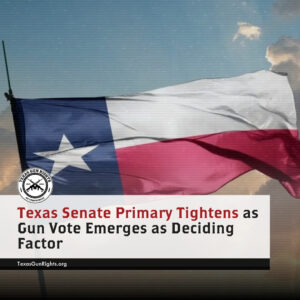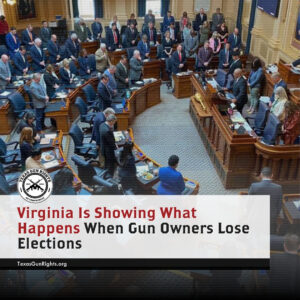With the Trump administration now at the helm, the DOJ formally dropped its appeal in the landmark case Mock v. Garland (now Mock v. Bondi), marking a total court victory for millions of lawful gun owners across the country who rely on pistol stabilizing braces.
This capitulation comes after two years of fierce courtroom fights, a chaotic regulatory rollout by the ATF, and relentless pressure from no-compromise gun rights groups like Texas Gun Rights and their national affiliate, the National Association for Gun Rights.
A Legal and Political Timeline of Overreach
In 2023, the Bureau of Alcohol, Tobacco, Firearms, and Explosives (ATF) under the Biden administration published a final rule titled Factoring Criteria for Firearms with Attached Stabilizing Braces.
That rule attempted to classify nearly 40 million braced pistols—firearms that had previously been considered lawful—as short-barreled rifles (SBRs) under the National Firearms Act (NFA).
That reclassification meant law-abiding gun owners were instantly faced with potential felony charges unless they registered their braced pistols, paid a $200 tax stamp, or destroyed/surrendered them. It was an outrageous power grab, and it backfired spectacularly.
Enter Mock v. Garland, a challenge brought by the Firearms Policy Coalition (FPC), brace owners like William Mock, and manufacturers like Maxim Defense.
In July 2024, the U.S. District Court in Northern Texas granted a summary judgment for the plaintiffs, ruling that the ATF’s brace rule was “arbitrary and capricious” and violated the Administrative Procedure Act (APA).
Then came the Fifth Circuit Court of Appeals, which warned the ATF that its rule was unlikely to survive.
Instead of learning its lesson, the Biden DOJ pressed on—until the Trump administration took over in 2025 and reversed course. Last week, the DOJ dropped its appeal, effectively securing a final legal victory for braced pistol owners nationwide.
What Is a Pistol Stabilizing Brace?
For the uninitiated, a pistol stabilizing brace is not a shoulder stock. It’s a device that attaches to the rear of a pistol, designed specifically to brace against a shooter’s forearm.
Originally developed to help disabled veterans and other individuals with limited mobility, braces allowed safe, accurate one-handed shooting.
But under the Biden-era rule, the ATF arbitrarily claimed that if a brace had the “appearance” or “capability” of being shoulder-fired, it magically transformed the pistol into a heavily regulated SBR under the NFA.
The rule’s six-factor test was so vague and subjective that it “provided no meaningful clarity,” as the court wrote—making it “nigh impossible” for average citizens to determine legality.
Texas Takes Legislative Action: SB 1596
In response to the regulatory overreach and growing confusion among gun owners and law enforcement alike, Texas Gun Rights took decisive action in the state legislature.
During the 2025 session, SB 1596, a measure strongly backed by Texas Gun Rights and spearheaded by Gun Owners of America, was passed and signed into law by Governor Greg Abbott in June.
The bill removes short-barreled firearms from the state’s prohibited weapons list, a necessary step given that state and local police often cannot reliably distinguish between a legally braced pistol and an illegal SBR.
SB 1596 does something simple yet profound: it removes state and local law enforcement from the business of enforcing vague and ever-changing federal classifications, restoring clarity for Texas gun owners.
TGR v. ATF: A Parallel Battle Won
While Mock v. Garland drew national headlines, Texas Gun Rights (TGR) wasn’t content to sit on the sidelines. The organization filed its own lawsuit in 2023—TGR v. ATF—challenging the pistol brace ban directly on behalf of its members.
In October 2023, U.S. District Judge Reed O’Connor granted a preliminary injunction, preventing the ATF from enforcing its brace rule against TGR members. The court recognized the same APA violations as in the Mock case, further solidifying the legal consensus that the ATF acted unlawfully.
This early legal success protected TGR members from prosecution while the national lawsuit worked its way through the courts—and now, with the DOJ’s withdrawal, the victory is final.
A Celebrated Victory—But Not the End of the Fight
Texas Gun Rights is celebrating, and rightfully so. Years of legal strategy, grassroots activism, and legislative work have culminated in a decisive win for Second Amendment advocates. But the group warns gun owners not to let their guard down.
“This victory is massive,” a TXGR spokesman said, “but as history shows, we must always be vigilant. The enemies of freedom are relentless, and so are we.”
The pistol brace ban is dead. But the broader war against unconstitutional gun control is far from over.
And if the courts, the states, and the people keep up the pressure, perhaps we’ll soon see more than just regulatory rollbacks—we’ll see lasting protections for every law-abiding American’s right to keep and bear arms.







